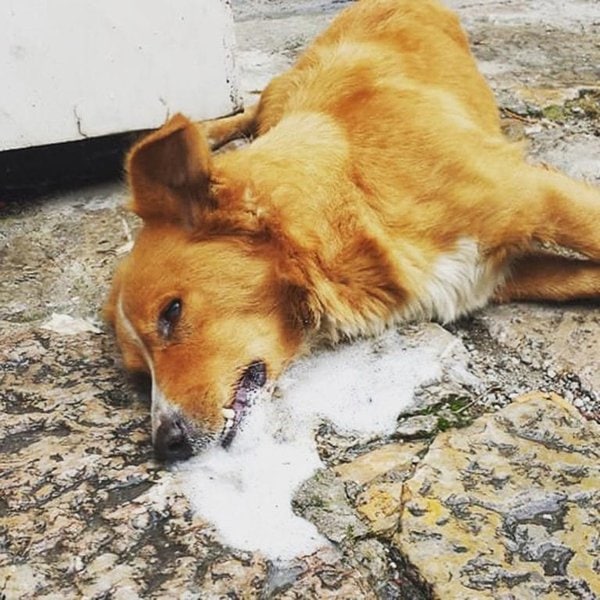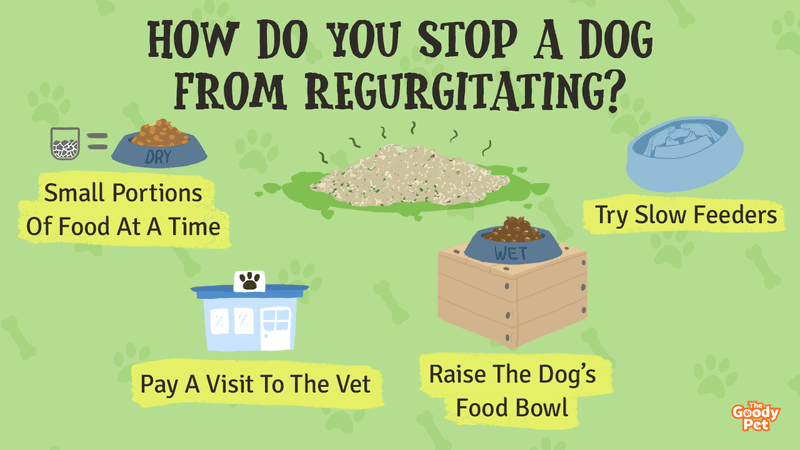If you are here, you are probably worried about your dog throwing up undigested food. And to be frank, there are a lot of reasons why this worry is warranted. So why do dogs throw up? And most importantly, what can you do to put them out of their misery?
In a nutshell, vomiting or regurgitation in dogs is more often than not a sign of digestive tract irritation. However, it could also be as a result of systemic conditions. And the best thing you can do for your dog is to take them to the vet.
Let’s take a closer look at the things that could cause your dog to throw up and what more you can do about it.
How Can You Tell The Difference Between Vomiting And Regurgitation In Dogs?
The best way to tell the difference between regurgitation and vomiting in dogs is through the contents and appearance of what the pooch throws up.
Regurgitation looks like chewed up dog food. This is best appreciated if the dog is on a dry kibble diet. However, even with soft dog food you will also notice that whatever is thrown up looks very similar to what they eat.
The reason for this appearance is that, for the regurgitation, contents of the esophagus or food have not stayed too long in the stomach. As such, digestion will not have altered the appearance of the food.
On the other hand, vomit can take many forms that look very little, if anything at all, like what the dog ate. This is because vomiting is as a result of throwing up food that has stayed a while in the stomach and has already started undergoing digestion.
The contents of vomiting in the dog could also be something other than food. This includes things like bile which appears yellowish-green, clear mucus, or even blood in serious conditions.
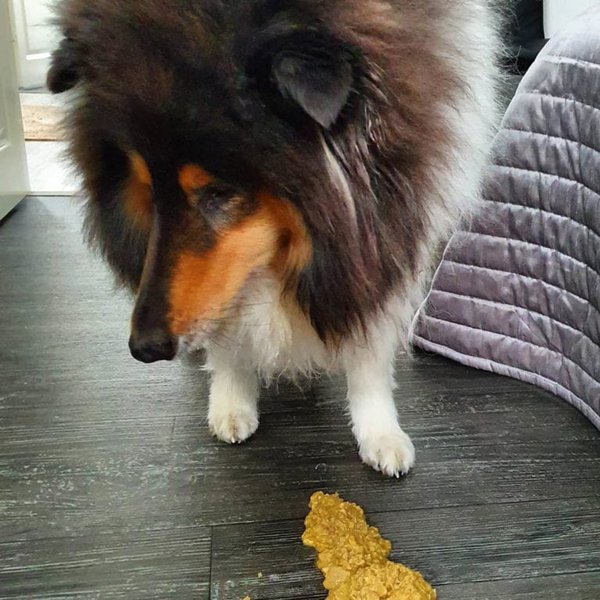
How Do You Stop A Dog From Regurgitating?
The best way to stop a dog from regurgitating is by changing how you feed them. This is because in most cases, regurgitation is caused by feeding practices and habits that load the digestive system with too much food, too fast, or in suboptimal angles.
To help you out, here are a few feeding practices you can implement to stop your dog from regurgitating and spare them the associated discomfort.
Small Portions Of Food At A Time
It is better to feed your dog smaller portions of food more times in the day than to have them eat few meals with large portions. By feeding them less food at a time, you give their digestive systems time to properly digest each portion.
This is a particularly important tip to implement if your dog is a breed prone to conditions that cause regurgitation like gastric volvulus which is triggered by eating too much at a time.
Raise The Dog’s Food Bowl
This is a simple but highly effective tip for dogs whose regurgitation is as a result of weak sphincters that allow reflux of stomach contents back into the esophagus and mouth.
By raising the bowl, you will be working against the gravity that worsens the reflux in most cases. Elevate both the dog’s water and food bowls and you will notice the changes in no time.
Try Slow Feeders
Eating too fast is another common culprit when it comes to causes of regurgitation in dogs. Fortunately, this is something that is very easy to fix. Simply invest in slow feeder bowls that are designed to make the dog take their time with their meals.
Slow feeders also serve the purpose of making feeding time fun for some dogs by turning it into a sort of treasure hunt on the bowl.
Keep Dog Upright For A Few Minutes After Meals
You could also stop your dog’s regurgitation by ensuring they stay upright at least for 10 minutes after their meal. This is another hack that works by preventing the reflux effects of gravity if the dog lays down too soon.
Pay A Visit To The Vet
Even with all these tips and tricks to try for your dog, nothing beats a visit to the vet. Sometimes, the regurgitation may be caused by something more serious than eating too much or too fast. So consult your vet as soon as you notice that your dog is regurgitating just to be safe.
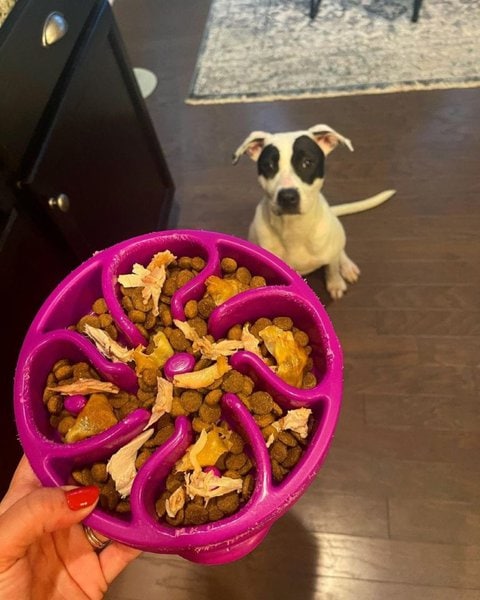
How Do You Hydrate A Dog That Is Throwing Up?
It is important to help rehydrate your dog after they throw up by making water enriched with some electrolytes easily accessible to them. Trust the dog’s instincts to go get water when their guts feel less irritated.
Make sure that the water is fresh and preferably in a raised bowl. This not only makes it easy for the dog, probably weakened by the ordeal, to get to it but the elevation comes in handy if the throwing up is due to gravity-associated regurgitation.
When the dog vomits, they don’t only lose water but also important electrolytes and sugars. It is therefore wise to add some salt and sugar to the water. About a half of a teaspoon of each for a cup of fresh water should be enough. You could also consult your vet for other dog-friendly electrolyte-rich drinks you could to the dog’s water.
If the dog’s digestive tract is too irritated for them to tolerate water, ice chips can come in handy.
If all these fail, your dog will need professional intervention before serious dehydration and electrolyte imbalance set in. In such severe cases, the dog may be rehydrated through intravenous infusions.
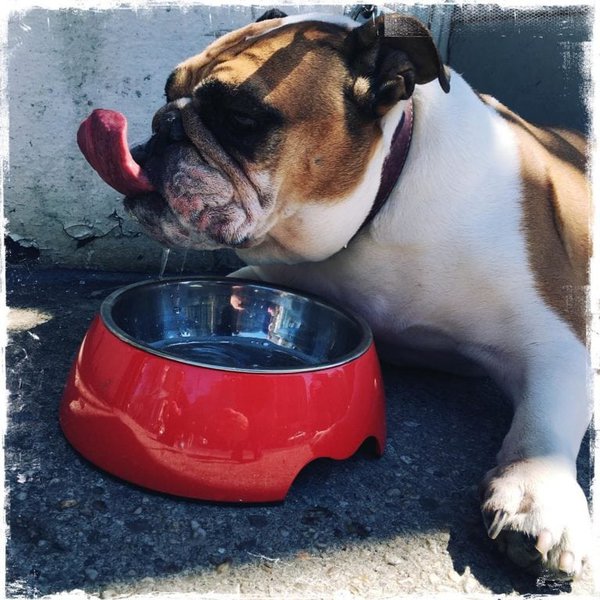
Should I Feed My Dog After He Throws Up?
You should not feed your dog for 6 to 12 hours when they are vomiting depending on how often and how much they are vomiting. Chances are that your dog will not even want to eat even if you gave them food.
Why should you wait this long to feed your dog again after they vomit? Here are the two main reasons.
Avoid Further Irritation Of The Gut
Gut irritation is responsible for dogs throwing up in most cases whether it is food intolerance or poisoning. By giving your dog food while they are in this state, you risk causing further damage by forcing a compromised system to work.
By withholding food for a few hours, the dog’s digestive tract will have time to recover from whatever was causing the irritation.
Avoid Aspiration
It can be difficult to tell when your dog is truly done vomiting. If you feed them while their bodies are still rejecting the food, chances are that the dog will end up throwing up what you feed them anyways.
This becomes problematic for dogs that have been vomiting for a while as there is the risk of them choking on the bigger, undigested chunks of food that you feed them. It is therefore best to wait a few hours where you can be a bit more confident that your dog is doing better.
In addition to withholding the food, make sure to restart the meals with small portions of light, neutral, and easy-to-digest dog food.
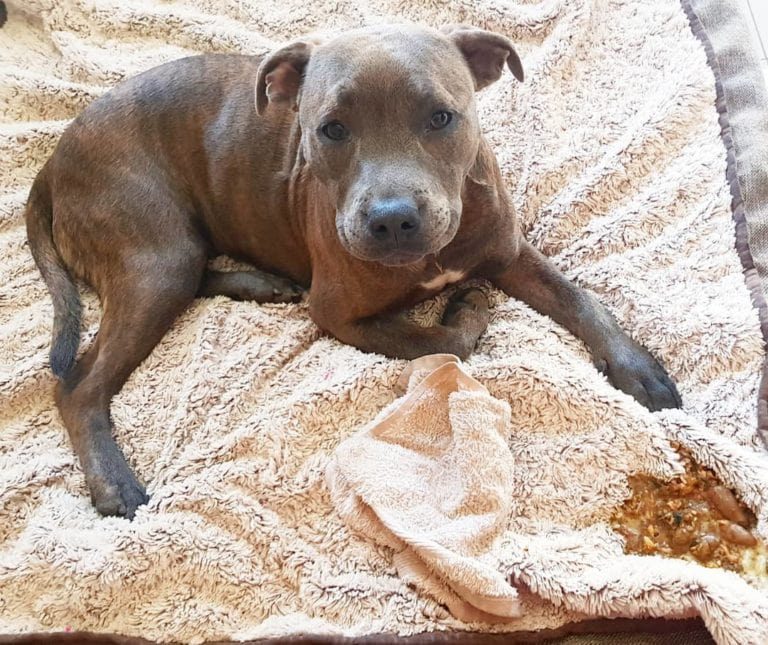
What To Do After Your Dog Throws Up?
The very first thing you should do if you notice your dog vomiting is to call your vet for a quick consult. More often than not they will tell you to wait and see. However, depending on the description of the vomit and other symptoms, you may have to take the dog in for a check-up.
In addition to this, here are a few more things you could do for your vomiting dog.
Give Your Dog A Comfortable Place To Relax
If your dog is vomiting a lot, they will inevitably be in a lot of discomfort and probably even some pain. The best you can do as you wait it out or wait for the remedy to kick in is to get them somewhere safe and comfortable to rest.
So make their bed nice and cozy or even let the dog cuddle up next to you on the couch until they feel much better.
Take The Dog Outside For Some Fresh Air
A little fresh air will do a lot for the dog. It may not be enough to stop the vomiting in some cases. However, it will help make the dog a lot more comfortable and reduce the nausea they are probably experiencing.
So if your vomiting pooch is up for it, just take a quick walk outside and just relax in the yard, balcony, or even a nearby park. You could also just crack open a window and have the dog relax near it.
Keep An Eye Out For Signs Of Underlying Conditions
If you choose to wait and see, keep an eye out for other symptoms that could point to more nefarious causes of the vomiting.
These include abdominal distention which could point to something like gastric volvulus. It could also be things like foaming or erratic behavior due to poisoning.

Why Would A Dog Throw Up Undigested Food?
Throwing up undigested food is not itself a condition but instead a sign of compromise in the mechanisms responsible for transporting ingested food to the stomach and keeping it there. This is what is referred to as regurgitation.
For some perspective on possible reasons why your dog is throwing up undigested food, here are some of the common causes.
Intestinal Obstruction
Intestinal obstruction is one of the most common reasons why your dog may be regurgitating undigested food. This is particularly common with obstructions higher up on the digestive tract.
In these cases, you may also notice other signs, for an example, constipation.
Food Allergies Or Intolerance
Food allergies can cause immediate irritation where the dog throws up undigested food. The irritation caused by the food intolerance could also have delayed results with the dog vomiting digested or partially digested food.
Some of the most common food allergies in dogs include gluten, grain, soy, and even meats like beef, chicken, lamb, and fish.
Eating Too Much Or Too Fast
Your dog may also be throwing up undigested food because they are either eating too much food, swallowing too fast, or both. The result here is straightforward, where the stomach gets too full of food and swallowed air to accommodate more and ends up sending the excess back up.
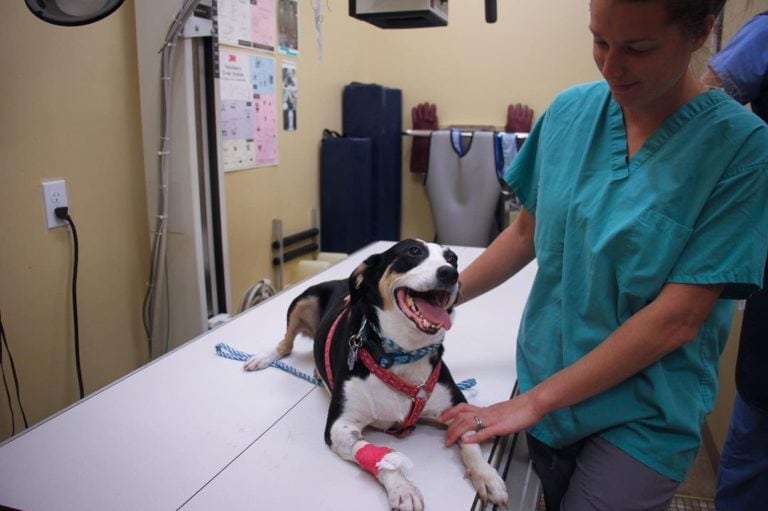
When Should You Be Concerned About Your Dog Throwing Up?
Throwing up occurs when the dog’s digestive system is unable to tolerate even appropriate amounts of food which is definitely cause for concern. This usually points to serious issues either in the gut or other crucial systems in your dog’s body.
Here are some of these serious causes that prove that throwing up is truly a worrying symptom in dogs.
Reflux Gastritis
Reflux gastritis is a condition caused by irritation of the stomach lining by things like bile or stomach acids after the dog goes for long periods without eating. Reflux gastritis is one of the main reasons why dogs throw up at night.
The condition is common especially with dogs that eat only one meal a day which leaves the stomach empty for most of the day.
Poisoning
Poisoning is another very common cause of throwing up in dogs and without a doubt one of the most worrying. With some toxins and poisons, lack of prompt treatment could be life-threatening for the dog.
If you notice signs like the dog foaming through the mouth, acting confused or erratically, seizures or shaking, you could suspect poisoning and should get your dog to the vet as soon as possible.
Systemic Illnesses
Regurgitation and vomiting in dogs could also sometimes be as a result of systemic illnesses. The most common are diseases of the liver, kidney, and hormonal organs like the thyroid.
With these systemic conditions, the imbalance caused by their impaired functions affects the functionality of the digestive system resulting in symptoms like vomiting.
